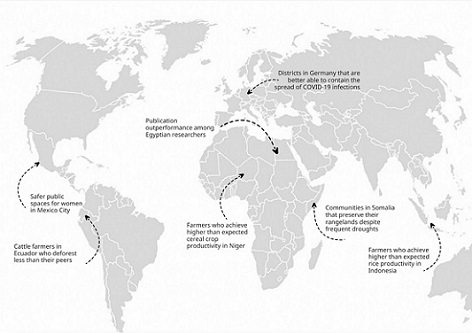Using digital datasets to identify positive deviants in development
Development studies often focuses on the negative: constraints, challenges, negative impacts, etc. But what if we could use new digital datasets to identify positive deviants: outlier individuals, households, districts and others that outperform their peers in achievement of development goals?
The 'Data-Powered Positive Deviance' (DPPD) programme – funded by GIZ and UNDP Accelerator Labs – has done just this. The programme built on an original idea by GDI researcher, Basma Albanna, that was fleshed out in a paper co-authored with Richard Heeks, GDI’s Professor of Digital Development. This argued that traditional methods of identifying positive deviants relied on costly and time-consuming primary data-gathering from the field. Instead, it might be possible to identify outliers in the growing number of digital datasets already available.
To test out this argument, DPPD undertook seven pilot projects spanning four continents (see figure). The projects analysed digital datasets to look for outliers in healthcare, in agricultural and R&D productivity, and in reducing deforestation, environmental degradation and gender-based violence.
The pilot projects have had a two-fold impact. Each individual project has identified outliers: more productive farmers, safer areas for women, pastoralists who preserve their environment, etc. Studying the characteristics of these positive deviants is enabling their good practices to be scaled out: protecting fields in drought-prone areas to preserve rainwater; encouraging informal commerce on streets where women walk at night; moving from private enclosures to community enclosures in Somalia; and so on.
Collectively, the learning from these projects has been collated into a new Data-Powered Positive Deviance methodology that guides development practitioners and data scientists on how to identify positive deviants, discover their special characteristics, and then scale those in order to achieve wider development impact.
While work continues to scale out the good practices in the pilot projects, the second generation of DPPD projects is already underway: in India on early sown wheat, in North Macedonia on financial governance, in Panama on deforestation, and in South Africa on early childhood education.
Find out more
- Listen to Richard and Basma discuss the project on the GDI podcast
- Read the paper: Data-powered positive deviance: Combining traditional and non-traditional data to identify and characterise development-related outperformers
- Data Powered Positive Deviance blog
- Data Powered Positive Deviance handbook
- Contact the Data Powered Positive Deviance team

